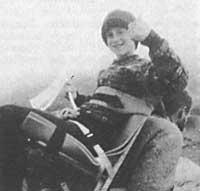Dogs manage to cure Duchenne muscular dystrophy by gene therapy
2018/09/01 Galarraga Aiestaran, Ana - Elhuyar Zientzia Iturria: Elhuyar aldizkaria

Replacing the defective gene that causes canine Duchenne muscular dystrophy with the CRISPR technique, researchers at the Southwestern medical center (University of Texas) have managed to cure the disease.
In the article published in the journal Science it is specified that they were subjected to treatment by injection; after eight weeks, the appropriate level of dystrophin protein (which is not produced properly by the disease) was 3 to 90% of normal, depending on the type of muscle. In the cardiac muscle of the dog that received the highest injection dose, it reached 92% of the normal level.
The previous results were also good in the mouse, but for the first time they have achieved it in a large mammal. In addition, the mutation of the dogs used in the experiment is similar to that of people with disease, so the news has aroused hope. However, Science itself has warned that to test it in humans it will take longer, as more experiments will have to be done to confirm that the treatment is safe and effective. And this time it has only been done with four dogs, which have only followed them 8 weeks.
Gai honi buruzko eduki gehiago
Elhuyarrek garatutako teknologia




